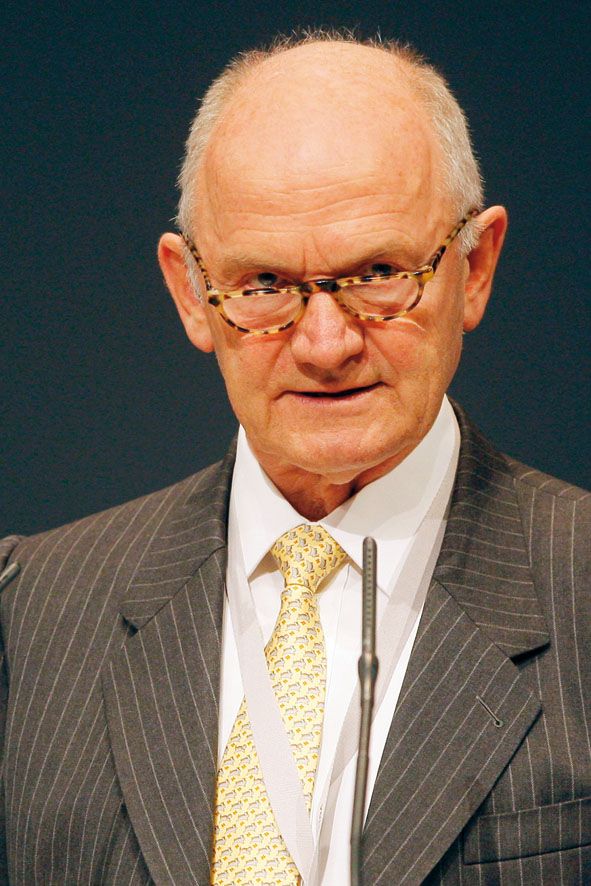Porsche’s takeover of Volkswagen is not going very smoothly. What was once established as friendly move to secure the independence of two companies is now redefining the meaning of hostile takeover. Sitting in the middle of this feud is Ferdinand Piech, chairman of Volkswagen’s supervisory board and a major shareholder in Porsche. As far as this merger goes, Piech has earned his seat at the table, but he might be eating two meals.
It started out innocent enough when Porsche announced it was buying a 30 percent stake in Volkswagen last September. Porsche said it did not want to own Volkswagen. Instead Porsche announced it needed to protect its interest in its business ties and own enough stock to prevent another company from taking over VW. This year Porsche has increased its stake in Volkswagen to over 35 percent (with plans to go as high as 50 percent in November) triggering an automatic takeover – what a difference a year makes.
There are many people having troubles with this deal: the unions are scared about Porsche’s past labor tactics; the German state of Lower Saxony, which owns 20 percent of VW, opposes the deal; and Volkswagen's management is resisting sharing technological information with Porsche. So, with these problems why would Porsche, whose revenues are only about one tenth the size of Volkswagen’s, want to make huge and risky financing deals to obtain Germany’s largest automaker? The silent force behind it all may be the one less investigated: ego.
Ferdinand Piech is the grandson of Ferdinand Porsche, the inventor of the Beetle and the first chairman of Volkswagen (under Adolph Hitler’s regime). While Hitler may have tarnished Ferdinand Porsche’s image, it did not harm his legacy.
Piech idolized the family patriarch. His early days with his grandfather turned Piech into a driven engineer who rose to high ranks at Porsche with a “win at all costs” attitude. When Piech eventually went to work for Volkswagen through Audi/NSU, he said it was because of the large engineering budget. But there may also be something else at work.
Piech is an aristocrat known for his ego, and his current control as chairman of Volkswagen’s supervisory board may just be as much about power as family vengeance. Piech’s grandfather was truly the father of Volkswagen by engineering the Beetle, and Piech’s father Anton Piech was instrumental in resurrecting VW after World War II (although he would never receive credit). Volkswagen belongs to Piech’s family, and maybe this merger is his way of showing they rightfully own it.
But Piech is not synonymous with Porsche. Although the two families are only separated by one generation (Ferdinand Porsche’s son and daughter: Ferdinand “Ferry” Porsche and Louise Piech) there is a lager rift growing. Last month Piech did not attend a key vote with Volkswagen’s board that would have allowed Porsche to freely cooperate on technical projects with Audi. As chairmen of the Volkswagen Group’s supervisory board, his absence stopped the deal and is seen as a large roadblock on the way to the complete merger of Porsche and Volkswagen.
Those around the deal saw this as sign that Piech did not fully support the merger with Porsche, which may be slightly true. Piech’s role in the merged Porsche/Volkswagen may be diminished, and Wolfgang Porsche looks like Piech’s new enemy. Wolfgang is Ferry Porsche’s youngest son, chairman of Porsche and a recent addition to Volkswagen’s supervisory board (as part of the merger). He said about Piech, "It's not a matter anymore of whether he's going or not. But when and how."
This latest move may be Piech supporting the unions, but it is more likely that history is repeating. Piech was a powerful figure when he was working at Porsche in the 60s and early 70s. Because Piech didn’t have the Porsche last name, he was not likely to takeover the Porsche company from his uncle Ferdinand “Ferry” Porsche. Ferry’s kids who were in the company at the time (Ferdinand “Butzi” and Peter) were more likely to takeover the company because of their powerful last name. But Piech’s aggressive nature showed Ferry that there would be a constant struggle for power in the next generation.
In his autobiography, Ferry said, “After I ascertained that the necessary harmony and cooperation could not be created, I drew the inevitable conclusion and said, ‘Then nobody’s going to be the boss!’”
This is what caused all Porsche family members to be banished from the company in 1971. This same “not backing down” mentality may be in play to try to oust his cousin Wolfgang Porsche from the Volkswagen and/or Porsche boards, so he can reign full power of whatever company is created.
Piech’s legacy is set in stone. He is cunning, smart, tenacious and conniving. I wouldn’t be surprised to see the 71-year-old in charge of the merged Porsche/Volkswagen in not too long.

